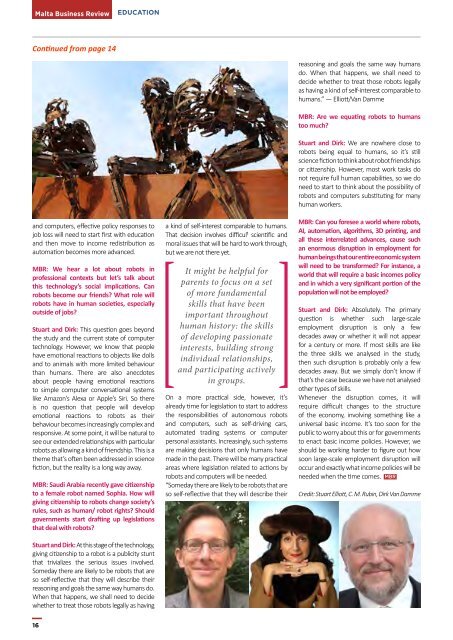MBR_ISSUE 40_Lowres
You also want an ePaper? Increase the reach of your titles
YUMPU automatically turns print PDFs into web optimized ePapers that Google loves.
Malta Business Review<br />
EDUCATION<br />
Continued from page 14<br />
and computers, effective policy responses to<br />
job loss will need to start first with education<br />
and then move to income redistribution as<br />
automation becomes more advanced.<br />
<strong>MBR</strong>: We hear a lot about robots in<br />
professional contexts but let’s talk about<br />
this technology’s social implications. Can<br />
robots become our friends? What role will<br />
robots have in human societies, especially<br />
outside of jobs?<br />
Stuart and Dirk: This question goes beyond<br />
the study and the current state of computer<br />
technology. However, we know that people<br />
have emotional reactions to objects like dolls<br />
and to animals with more limited behaviour<br />
than humans. There are also anecdotes<br />
about people having emotional reactions<br />
to simple computer conversational systems<br />
like Amazon’s Alexa or Apple’s Siri. So there<br />
is no question that people will develop<br />
emotional reactions to robots as their<br />
behaviour becomes increasingly complex and<br />
responsive. At some point, it will be natural to<br />
see our extended relationships with particular<br />
robots as allowing a kind of friendship. This is a<br />
theme that’s often been addressed in science<br />
fiction, but the reality is a long way away.<br />
<strong>MBR</strong>: Saudi Arabia recently gave citizenship<br />
to a female robot named Sophia. How will<br />
giving citizenship to robots change society’s<br />
rules, such as human/ robot rights? Should<br />
governments start drafting up legislations<br />
that deal with robots?<br />
Stuart and Dirk: At this stage of the technology,<br />
giving citizenship to a robot is a publicity stunt<br />
that trivializes the serious issues involved.<br />
Someday there are likely to be robots that are<br />
so self-reflective that they will describe their<br />
reasoning and goals the same way humans do.<br />
When that happens, we shall need to decide<br />
whether to treat those robots legally as having<br />
a kind of self-interest comparable to humans.<br />
That decision involves difficult scientific and<br />
moral issues that will be hard to work through,<br />
but we are not there yet.<br />
It might be helpful for<br />
parents to focus on a set<br />
of more fundamental<br />
skills that have been<br />
important throughout<br />
human history: the skills<br />
of developing passionate<br />
interests, building strong<br />
individual relationships,<br />
and participating actively<br />
in groups.<br />
On a more practical side, however, it’s<br />
already time for legislation to start to address<br />
the responsibilities of autonomous robots<br />
and computers, such as self-driving cars,<br />
automated trading systems or computer<br />
personal assistants. Increasingly, such systems<br />
are making decisions that only humans have<br />
made in the past. There will be many practical<br />
areas where legislation related to actions by<br />
robots and computers will be needed.<br />
“Someday there are likely to be robots that are<br />
so self-reflective that they will describe their<br />
reasoning and goals the same way humans<br />
do. When that happens, we shall need to<br />
decide whether to treat those robots legally<br />
as having a kind of self-interest comparable to<br />
humans.” — Elliott/Van Damme<br />
<strong>MBR</strong>: Are we equating robots to humans<br />
too much?<br />
Stuart and Dirk: We are nowhere close to<br />
robots being equal to humans, so it’s still<br />
science fiction to think about robot friendships<br />
or citizenship. However, most work tasks do<br />
not require full human capabilities, so we do<br />
need to start to think about the possibility of<br />
robots and computers substituting for many<br />
human workers.<br />
<strong>MBR</strong>: Can you foresee a world where robots,<br />
AI, automation, algorithms, 3D printing, and<br />
all these interrelated advances, cause such<br />
an enormous disruption in employment for<br />
human beings that our entire economic system<br />
will need to be transformed? For instance, a<br />
world that will require a basic incomes policy<br />
and in which a very significant portion of the<br />
population will not be employed?<br />
Stuart and Dirk: Absolutely. The primary<br />
question is whether such large-scale<br />
employment disruption is only a few<br />
decades away or whether it will not appear<br />
for a century or more. If most skills are like<br />
the three skills we analysed in the study,<br />
then such disruption is probably only a few<br />
decades away. But we simply don’t know if<br />
that’s the case because we have not analysed<br />
other types of skills.<br />
Whenever the disruption comes, it will<br />
require difficult changes to the structure<br />
of the economy, involving something like a<br />
universal basic income. It’s too soon for the<br />
public to worry about this or for governments<br />
to enact basic income policies. However, we<br />
should be working harder to figure out how<br />
soon large-scale employment disruption will<br />
occur and exactly what income policies will be<br />
needed when the time comes. <strong>MBR</strong><br />
Credit: Stuart Elliott, C. M. Rubin, Dirk Van Damme<br />
<strong>MBR</strong><br />
16

















